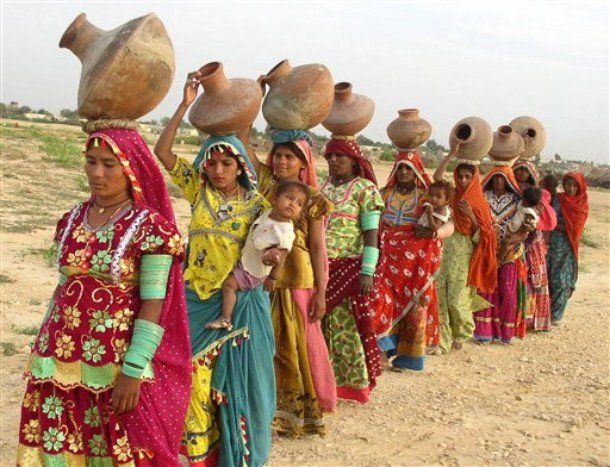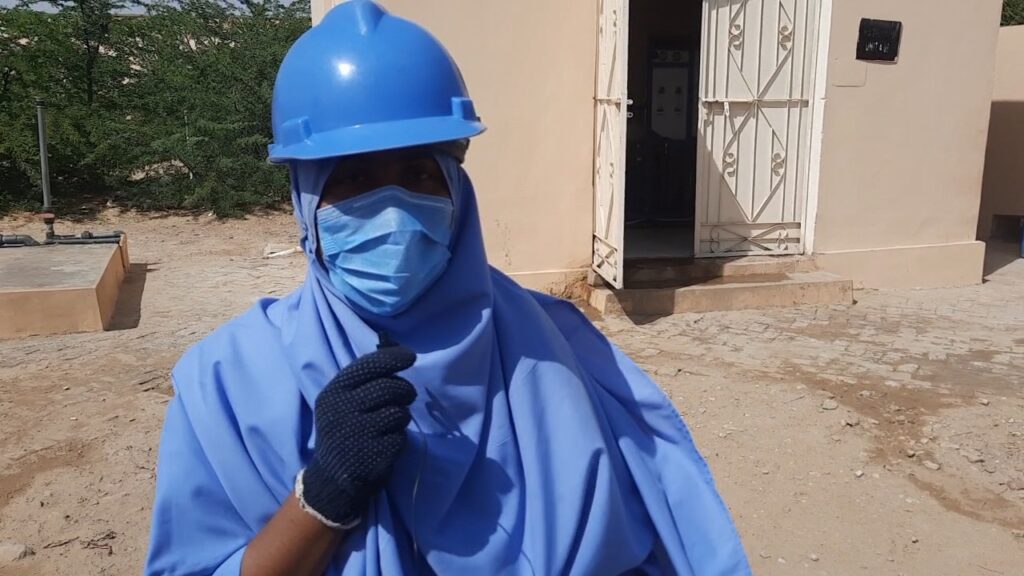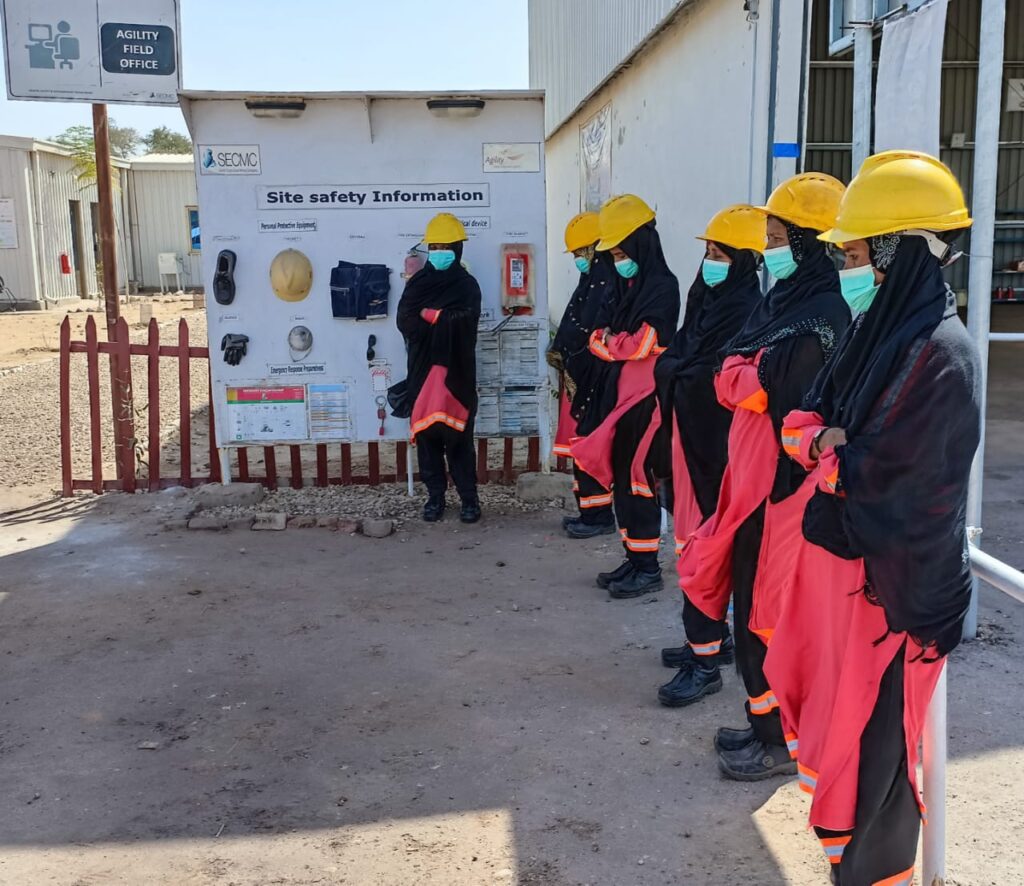Women are operating water filtration and reverse-osmosis (RO) plants in the remote area of Tharparkar desert in Sindh, Pakistan. These women had to walk miles in scorching sun to fetch water.
“For us, the day used to begin with carrying water pitchers, which we filled from stored rainwater or small natural tanks, after walking on hot sand for hours,” a Thari women said.

“Now, most of the villagers have access to these RO plants set-up in the area with the advent of coal-mining and power generation companies.”
More than two mining and power generation companies are operating in Thar desert including Sindh Engro Coal Mining Company (SECMC), Engro Powergen, Sino Sindh Resources and Shanghai Electric.
The population of 1.6 million in the district of Tharparkar has been surviving on contaminated, saline or untreated groundwater as long as anybody can remember. Multiple governments have announced schemes to improve life for the Thari people but no tangible projects have materialised.
Thar Foundation has installed 17 RO plants including 10 handed over by the government of Sindh. These RO plants are providing WHO standard drinking water free of cost to a population of more than 30,000.

The 80 percent of the local population has access to clean drinking water through above RO Plants. Moreover, Thar Foundation has trained local women in operation and maintenance of RO plants.
This is just one instance of the social uplift, Thar desert is witnessing as large scale mining and industrial activities gain pace in the area.
“We get water, our children are going to schools, there are health facilities, while a large number of men and women have gotten respectable jobs, such as myself,” a resident said and hoped that more coal mining and power generation companies would come to the region and would contribute in the social uplift of the region.
Further, in a revolutionary step in this remote region, where females do not even know how to drive, the mining companies provided training for dump truck driving to more than 52 Thari women to transport coal.
“It was a dream coming true,” one such driver said. “First I was quite scared of such a large vehicle. But, I completed my training and now I am supporting my family. My children are getting good food and clothes, as well as education.”

Along with its technological components e.g., the mechanization of labour and the reliance upon inanimate sources of energy, the process of industrialization entailed profound social developments in the barren Thar.
Over two dozen schools have also been setup in Islam Kot and Mithi, having capacity of 5,500 students. The employment of locals is not just confined to skilled labor. The mining and power generation companies also invest into developing local youth to mainstream them in both engineering and management cadre of the company.
“Thari men and women working here are skilled and trained and can earn their living anywhere in the world,” a local noble said.
Businesses create new jobs and produce wealth. But if they fail to act responsibly, they can also pose a threat to society and the environment. Corporate Social Responsibility (CSR) mitigates corporate damage by encouraging socially responsible, and environmentally-friendly, actions.
According to MDPI Open Access Journals, the coronavirus pandemic has highlighted the importance of businesses CSR strategies. “In response to the crisis, some corporations remained loyal to their understanding of ethics, some stepped up and helped their society with all the means at their disposal, while some others took advantage of the situation and tried to gain short-term benefits”.
There have been infrastructure developments in the region also. In the first phase, the entire population of a village has been relocated.
It was done through a participatory approach, including both males and females of the community. The design and construction process for Phase I (Village Sehnri Dars) has been carried out by renowned housing & town planning experts who will ensure state-of-the-art structures, enhancing the quality of life without compromising the natural ecosystem, social fabric, lifestyle, and traditions of the Thari people.
“They have given similar houses to every family regardless of religion and social status,” a resident at the relocated village said.
Coupled with successful bio-saline agriculture at Thar Block-II, Thar Foundation also initiated breeding fish in the Gorano Reservoir, where the groundwater extracted from the depth of 180 meters, containing 5000 ppm, is stored by the coal mining company.

An unbelievable development and success achieved as fisheries in Thar desert. Seven fish species including Morakhi (Mrigal Carp), Rohu (Labea Rohita), Theli, Kuriro, Gulfam, African Catfish, and Dangri (Barramandi) recommended by Sindh Fisheries Department are being raised in the project.
Initially 100,000 fish seeds were released in Gorano Pond after rigorous testing of fish species in saline water ponds. Fishes were raised on organic feed and SGS and GEMS labs declared the fish as fit for human consumption.
The extension plan was launched under Desert Fisheries Initiative in collaboration with Livestock and Fisheries Department, Sindh where 200,000 seeds were released in 2019. In last three years more than 20,000 KGs of fish catch was distributed to local villages free of cost.
The Thar coal mining companies are working for the betterment of the people of Tharparkar through graduated and sustainable interventions in the fields of healthcare, education, livelihood, community infrastructure, gender equality, clean drinking water & sanitation services and disaster management.

